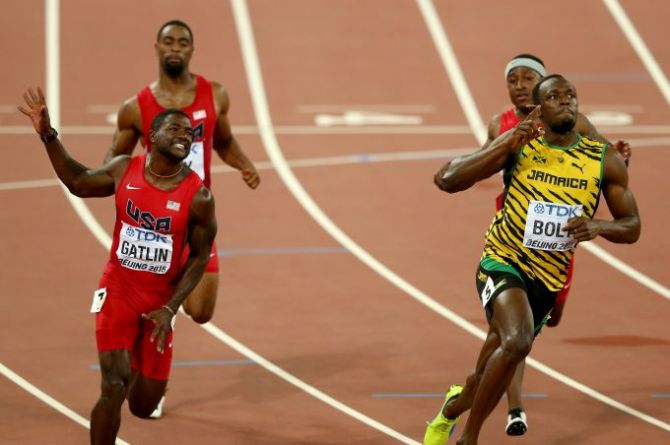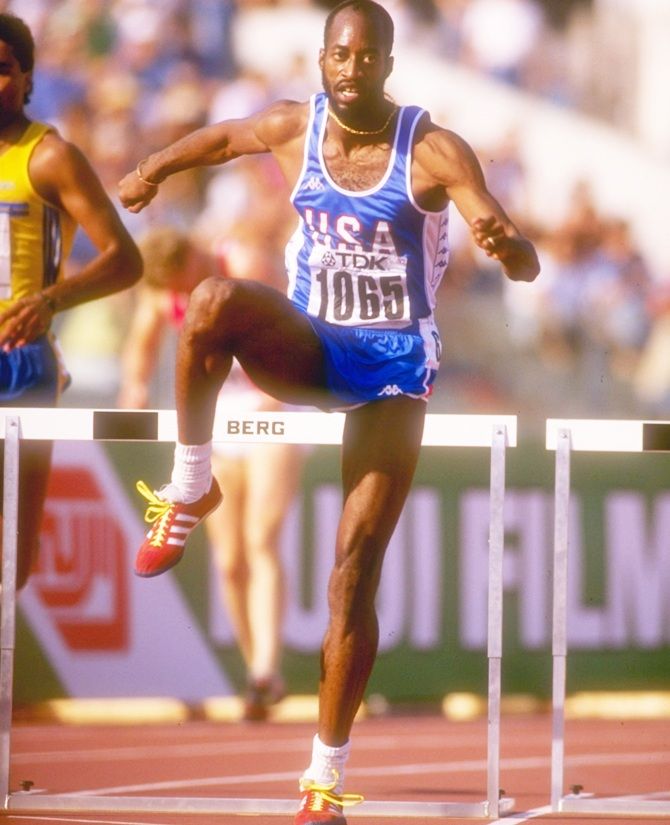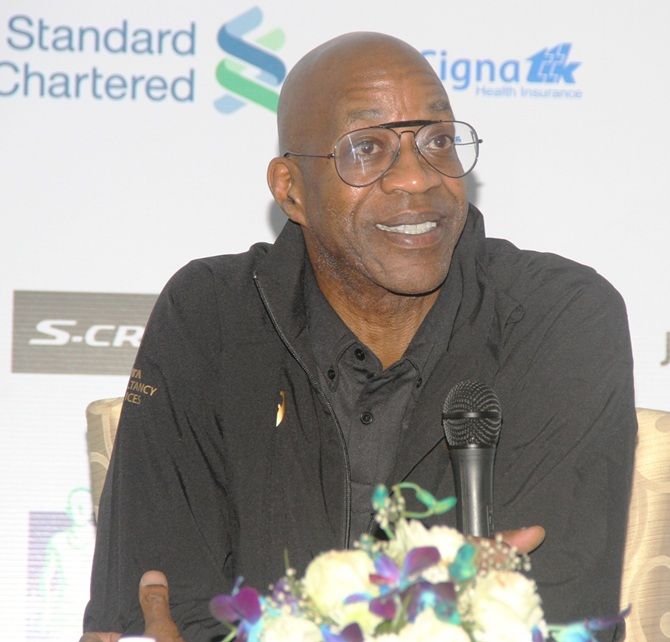'They need to see Bolt compete and struggle and come back from losses,' Edwin Moses, athletics legend, tells Laxmi Negi/Rediff.com

Edwin Moses is a genuine track and field legend, having dominated the 400 metres hurdles event for almost a decade.
He won his first Olympic gold in record time in 1976 at Montreal, missed out on a certain gold at Moscow four years later because the US boycotted the 1980 Olympics and won a second Olympic gold in Los Angeles. Ed also won won 122 consecutive -- yes, 122 consecutive -- races!
The super athlete also has a bachelor's degree in physics and a master's degree in business.
Ed Moses has used his star power over the last 20 years to become one of athletics' foremost anti-doping campaigners.
Speaking about the doping scandals currently dogging athletics, Ed Moses told a media conference for the Standard Chartered Mumbai Marathon, "All the news that is coming out is horrible. In track and field, the federation has let the athletes down."
"I stand for protecting the athletes and making sure that anybody who is responsible should be accountable," he said, "whether you are an athlete or coach or administrator, president of a federation, everyone should have the same amount of accountability."
In an exclusive interview with Laxmi Negi/Rediff.com, Edwin Moses asserts he belongs to the golden era of track and field.
What would you like to be remembered as? Perfect hurdler or unbeatable hurdler?
It doesn't matter. I don't think I was a perfect hurdler, but I guess I did win all the time.
Given a choice, would you have liked to rule the 400 metres hurdles today?
No. I think I was in the most historical and golden era of track and field.
When I clocked a world record in 1983, the video tape had to fly to New York to be put on television on Sunday, two days after the event. It took two days for my world record to be seen on television. Now, it is instant. (Ed, by the way, watches his races on YouTube)

What about the doping scandal?
I am the chairman of the United States Anti-Doping Agency. I also work with the World Anti-Doping Agency (WADA). Going back to the 70s and 80s I was one of the athletes who believed in true sport.
I never took medical supplements, believed in diet and exercising. I always represent clean athletes.
When my son or daughters go into sports like cycling or basketball, gymnastics, I don't want to see them using drugs to be competitive. When they have the talent, they don't need performance enhancing drugs.
All the news that is coming out is horrible. In track and field, the federation has let the athletes down. The federation (The Sebastian Coe-led International Association of Athletics Federations) has the same type of credibility as the athletes.
You can't put the blame on anybody. But from the athletes' point of view, it is very disgusting. It is a travesty, what's happening.
I stand for protecting the athletes and making sure that anybody who is responsible should be accountable, whether you are an athlete or coach or administrator, president of a federation everyone should have the same amount of accountability.
Athletics' credibility is at stake today.
With the allegations today, my opinion means nothing. The facts speak for themselves.
Your record stood for a long time...
Six, seven years ago, there were many athletes running 47 seconds in hurdles. Last year, there were 1, 2 people running below 47 seconds. There are ups and downs in athletics. I wish I was young enough to be still running as my time would have been at the top of the pack.
I ran a lot of cross country races. I used to live with Kenya's Henry Rono. I would get up in the morning and do a lot of endurance training by running 800m and 1500m. Between 1977 and 1980, I was mostly in Europe. I ran 22, 25 race in a year.
In 1980, the (Moscow) Olympic year (which the US boycotted and he missed out) I ran four races in six days.
Is it a matter of time that somebody of your stature will come into hurdles, somebody like the Usain Bolt of 400m hurdles? Aren't you impressed by Bolt?
The first time I ran under 50 seconds, I said I can run 48 seconds. When I ran 48 seconds in 1976 and later also ran 47.2 seconds (his career-best time), I knew I could run faster.
I was travelling and running all over the places. I never had the competition or it would have been possible for me to run 46 seconds.
Track and field is a big sport and it will always have big names. I was winning by 15 yards when I was 20, 21 years old. For me, it is no big deal.
There is always going to be someone like that (Usain Bolt). The only difference when I was running and now is the difference in the media. That is the ONLY difference.
When Usain is done and dusted, there aren't many recognised stars in athletics, is there? Will track and field become more vulnerable?
The biggest mistake of track and field is not having a system where they compete 5, 6 times a year against each other.
I ran against everybody all the time -- sometime twice a week. The big error is you see Bolt run five times a year and that isn't enough. In our era, even if we would win those five races and went home, fans won't take that. They need to see you run head to head, not just at the world championships or the Commonwealth Games or the Olympics.
They need to see you head to head against your top competitors, and these days fans are not getting that.
It's not just happening in the 100m, but all the events. The fans don't need to see Bolt win all the time, but they need to see him compete and struggle and come back from losses.
How difficult is it for an Asian to win an Olympic athletics gold?
It doesn't matter who you are. It can happen to anybody. We have Kenyan, Dominican Republic and even Scandinavian Olympic gold medalists. All you need is will power.

What else have you been doing after retirement?
A lot of people know of Laureus as World Sports Awards, we have been doing that for the last 16 years. I am the chairman of the Laureus World Sports Academy. We use sports as a tool for change.
We started in 2001 with 6 projects in 4 countries. 2 donations, sponsors. At the end of 2015 we have raised and given away money. We now have 150 projects in 35, 40 countries.
We find kids who need help, we connect them with sports programme and surround them with people who not only teach them sports, but leadership. They help them deal with problems like drug abuse, AIDS, or malaria, we deal with all kinds of things.
When is your book coming up?
It is coming up. I have written 400 pages already. I am holding it because there have been a lot of books. I almost had a book coming up during the London Olympics, but the problem was that there were 26 other books on the Olympics. So I didn't want to get lost in the clutter.












 © 2025
© 2025